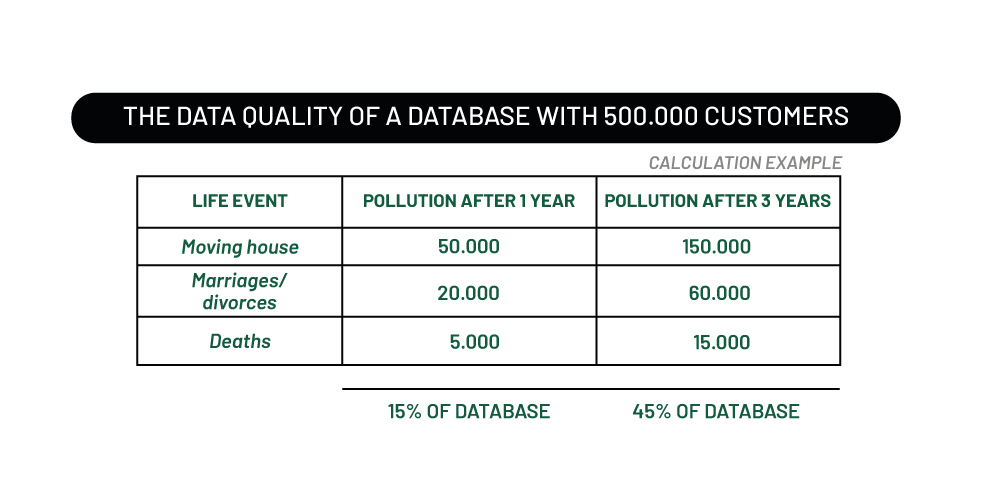Belgium is constantly in motion. If we look at the statistics, we see that on an average day, more than 2700 Belgians move, 312 children are born, 310 compatriots pass away, 112 couples say "I do," but unfortunately, 62 marriages end. Sadness and joy alternate rapidly with all these life events.

What impact do all these changes have on your database? Viewed through a customer data lens, every move, wedding, or funeral is a change that affects the quality of customer data.
Imagine: you work in a company that serves around 500,000 customers, and all their essential information such as last name, age, address, and phone numbers are gathered in a well-organized database. What if we let time take its toll for one or three years without paying attention to data quality? How would your customer data fare over time?
The following example shows that the quality of data deteriorates very quickly. After one year, about 15 percent of the database is no longer up-to-date, and after three years, this has escalated to 45 percent. These percentages are based on only three variables and the assumption the database is complete and current. A complete and up-to-date database at the outset is often not a given because errors are frequently made when entering data in practice. Not surprising, as the more people input customer data, the greater the chance of errors.

What does the GDPR say about this?
That data quality influences the degree of suitability of data for the ultimate intended purpose is well-known. Less known, is that the GDPR even specifically states what organizations must do to achieve the quality of customer data:
"Personal data must be accurate and, where necessary, kept up to date; every reasonable step must be taken to ensure that personal data that are inaccurate, having regard to the purposes for which they are processed, are erased or rectified ('accuracy')."
Users of customer data thus face a considerable challenge.
Customer services, communication, marketing, finance, and IT
Which company in Belgium today isn’t data-driven? Data is the fuel on which companies grow and a way to distinguish from the competition. Increasingly more professionals are realizing this. That’s why data quality has gained a prominent place on the list of critical company processes. Especially considering that the dependency on, and responsibility for, data transcend departmental boundaries. Customer services want to assist and retain customers, the communication department wants to communicate in a relevant way, marketing and sales aim for optimal reach and return on investment. The finance department wants customers to fulfill their financial obligations, and IT fully understands that applications and infrastructure are worthless without data. Despite the awareness of the importance of data, accurately collect customer data and keeping it up-to-date remains a significant challenge. The results of our benchmark confirm this.
Benchmark on customer data
For our benchmark, we analyzed the data quality of nearly a hundred companies. We wondered: how up-to-date is the customer data? And how accurately is customer data recorded? This resulted in some striking findings:
There is much to gain in terms of data quality.
We’re here to assist you further
Hopefully, you’ve been convinced of the importance and necessity of data quality. After all, as an organization, you want to comply with the GDPR but also be data-driven. But where do you start? Know that customer data must adhere to the ACCU principle: Actuality, Correctness, Completeness, and Uniqueness. These are the prerequisites for optimal data quality. The three steps you need to take for this are detailed in this customer case study from online retailer Klingel. For further insights and handy tips, download our whitepaper with six tips on how to improve data quality within your organization.
Questions about us or our services? Leave your details below and we will get back to you.
In this brochure you will learn more about how you can apply Audiences from EDM and what the advantages are of targeting the most relevant audience
Would you like to know more? Leave your details below and we will send you the Audiences brochure as a PDF.
Wondering how your organisation can achieve higher conversions with its own customer data? Leave your details and receive the full whitepaper immediately.
Are you responsible for acquiring new customers? Do you use data in your campaigns? Then use the SMART Audience Builder and convert up to 600% better than before in just a few clicks.
The SMART Audience Builder is an easy-to-use cloud tool that provides organizations with the ability to apply knowledge and insights to their own marketing data in order to increase conversions. Load any form of your own CRM data (Postal Code, House Number, Addition, Email, Phone) into the tool and gain additional insights from your own data. Through automatic integration with various knowledge and intelligence sources, you can apply attribute selections and predictive models to set up the most effective target audiences for activation. Throughout the entire process, you remain in control of your own data.
Approaching new relevant consumers who are genuinely interested in your proposition or product? EDM helps organizations create insights into existing customer groups, which can then be used to find potential new customers within the Netherlands.
With Audiences, we analyze the target audience based on historical data and data from current customer segments. This results in a target audience profile and channel preferences. We then set goals for all desired channels (Direct Mail, DPG media, Marktplaats, phone, and inserting). With access to extensive consumer databases, the best audiences are created based on various socio-demographic data, lifestyle characteristics, or advanced look-alike models. This enables the creation and activation of the best possible audiences, resulting in an average doubling of conversions.
An integrated customer acquisition solution. The proven method for effective data-driven marketing.
For every organization, acquiring new customers is crucial. To achieve this, recruitment campaigns need to be set up as effectively as possible. This means approaching the right target audience through the right channels in a data-driven manner. EDM has a proven method for data-driven marketing, which involves an iterative process consisting of 6 steps:
EDM analyzes the existing customer database and ensures its accuracy and currency. It improves the quality of incoming leads and analyzes them to gain insights into "who is the customer?". Then, an assessment is made of the channels already being used, which additional channels can be added, and how to optimize them as effectively as possible. This results in improved conversion rates and effectiveness, which serves as input for reworking non-conversions and continuously optimizing recruitment campaigns.
Are you responsible for acquiring new customers? Do you use data in your campaigns? Then use the SMART Audience Builder and convert up to 600% better than before in just a few clicks.
The SMART Audience Builder is an easy-to-use cloud tool that provides organizations with the ability to apply knowledge and insights to their own marketing data in order to increase conversions. Load any form of your own CRM data (Postal Code, House Number, Addition, Email, Phone) into the tool and gain additional insights from your own data. Through automatic integration with various knowledge and intelligence sources, you can apply attribute selections and predictive models to set up the most effective target audiences for activation. Throughout the entire process, you remain in control of your own data.
Approaching new relevant consumers who are genuinely interested in your proposition or product? EDM helps organizations create insights into existing customer groups, which can then be used to find potential new customers within Belgium.
With Audiences, we analyze the target audience based on historical data and data from current customer segments. This results in a target audience profile and channel preferences. We then set goals for all desired channels (Direct Mail, DPG media, Marktplaats, phone, and inserting). With access to extensive consumer databases, the best audiences are created based on various socio-demographic data, lifestyle characteristics, or advanced look-alike models. This enables the creation and activation of the best possible audiences, resulting in an average doubling of conversions.
An integrated customer acquisition solution. The proven method for effective data-driven marketing.
For every organization, acquiring new customers is crucial. To achieve this, recruitment campaigns need to be set up as effectively as possible. This means approaching the right target audience through the right channels in a data-driven manner. EDM has a proven method for data-driven marketing, which involves an iterative process consisting of 6 steps:
EDM analyzes the existing customer database and ensures its accuracy and currency. It improves the quality of incoming leads and analyzes them to gain insights into "who is the customer?". Then, an assessment is made of the channels already being used, which additional channels can be added, and how to optimize them as effectively as possible. This results in improved conversion rates and effectiveness, which serves as input for reworking non-conversions and continuously optimizing recruitment campaigns.